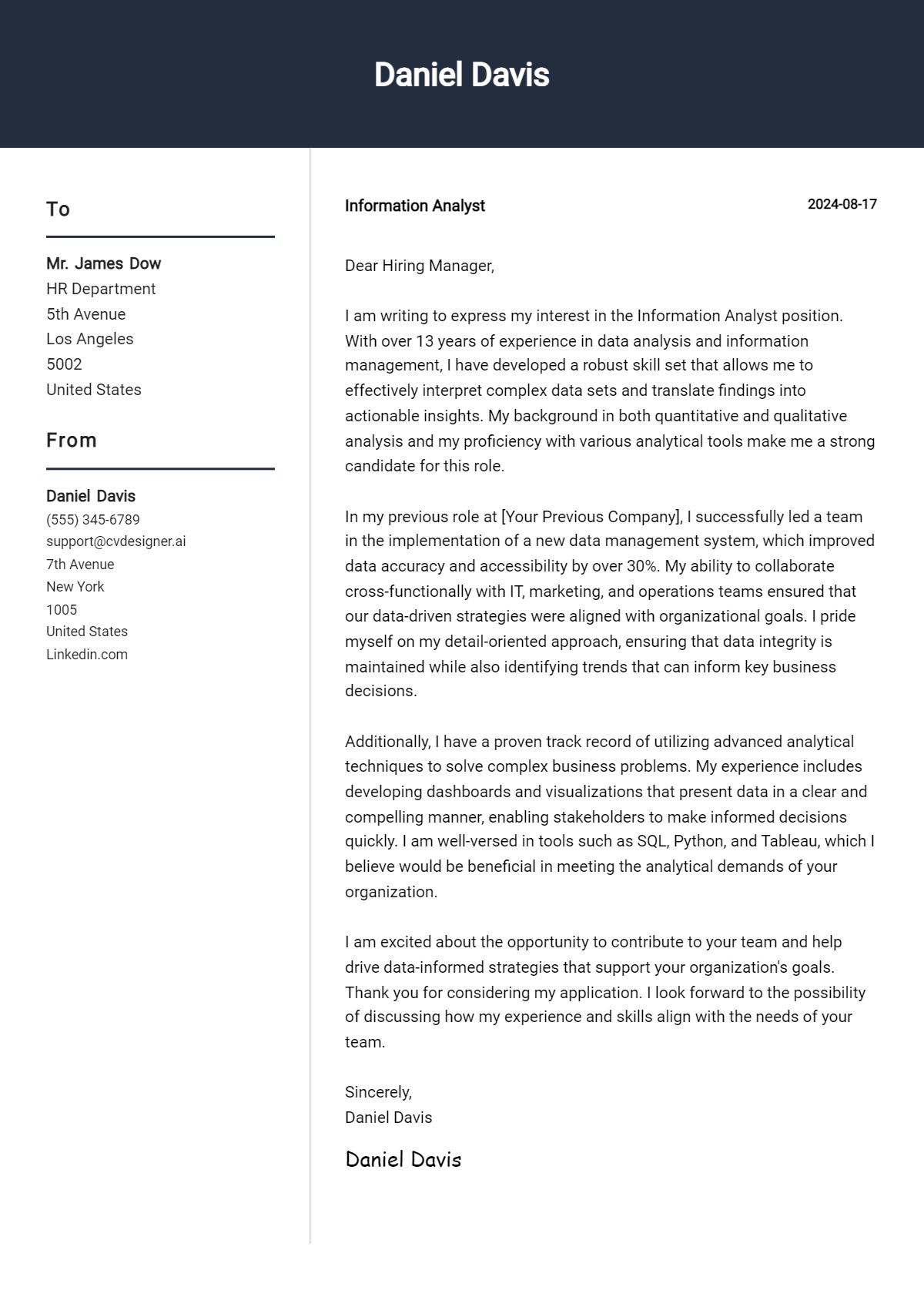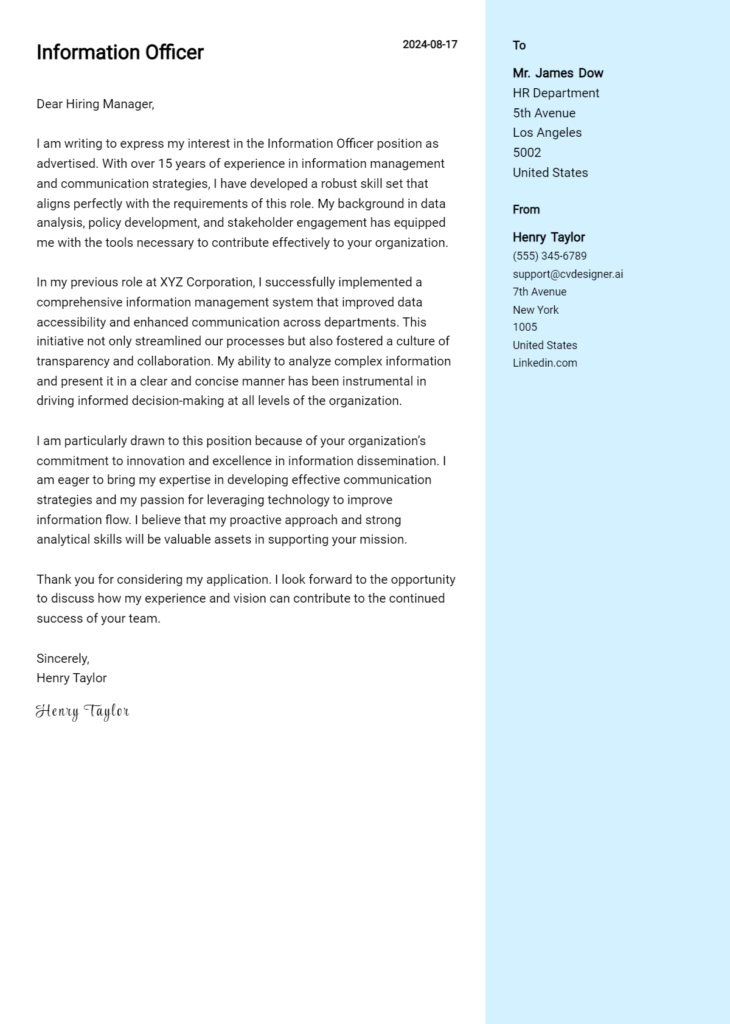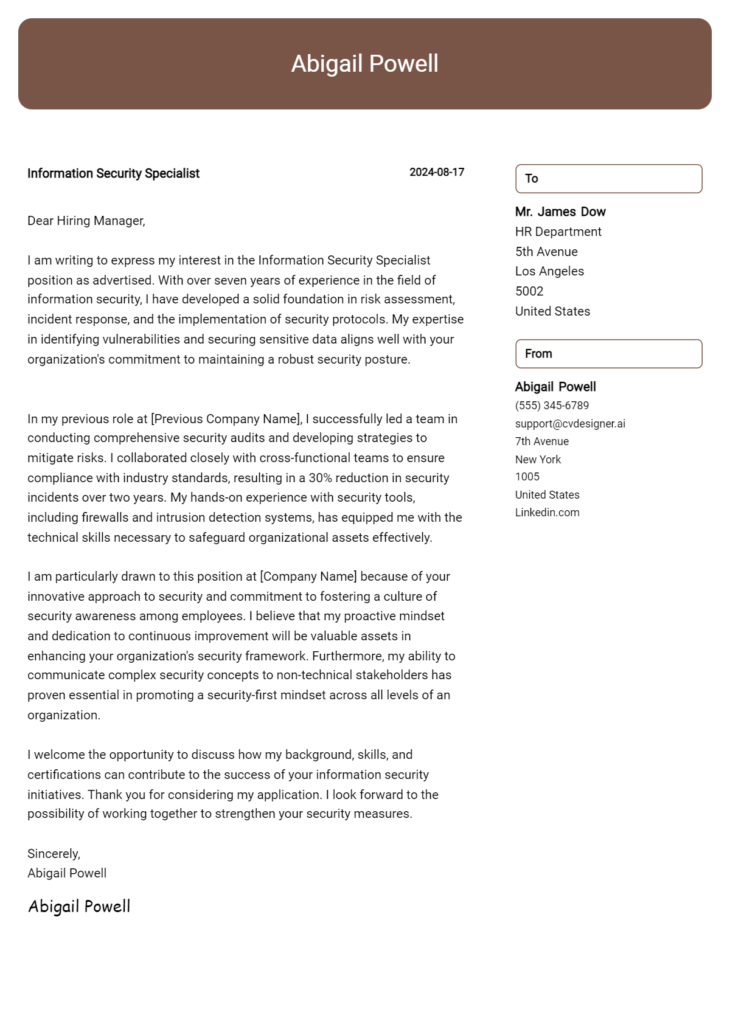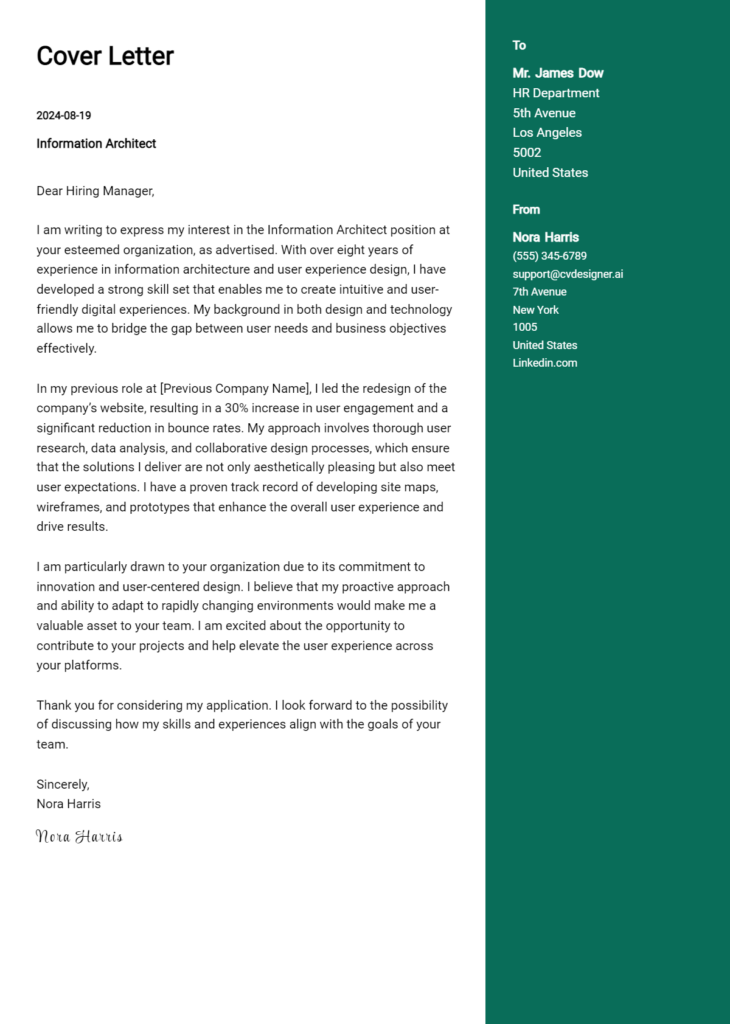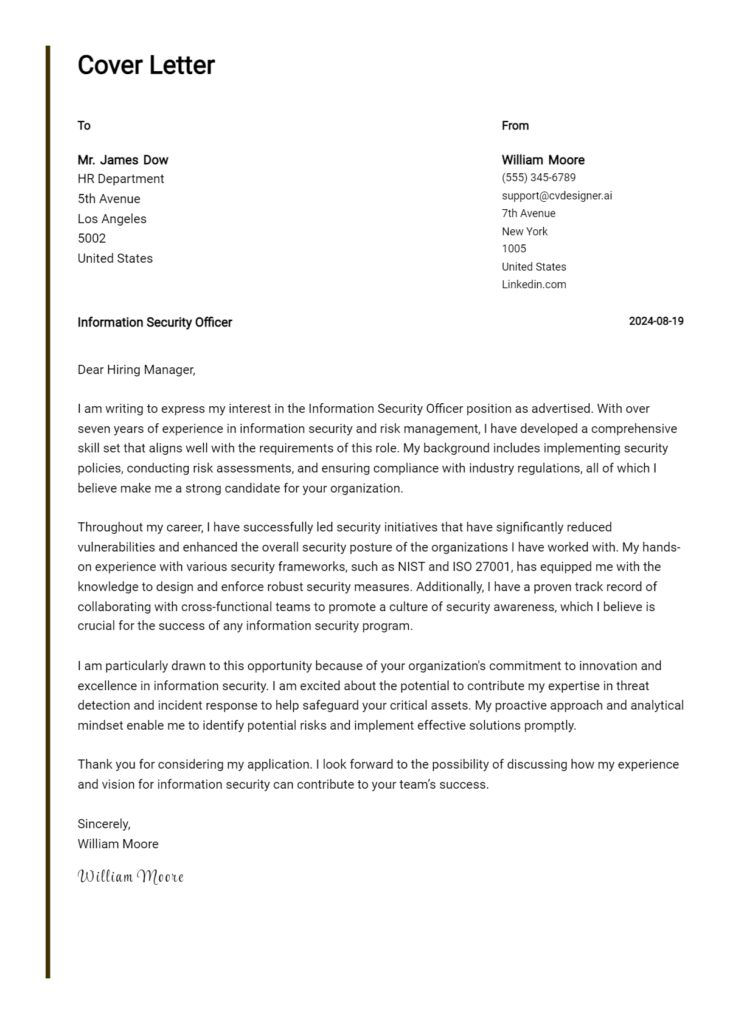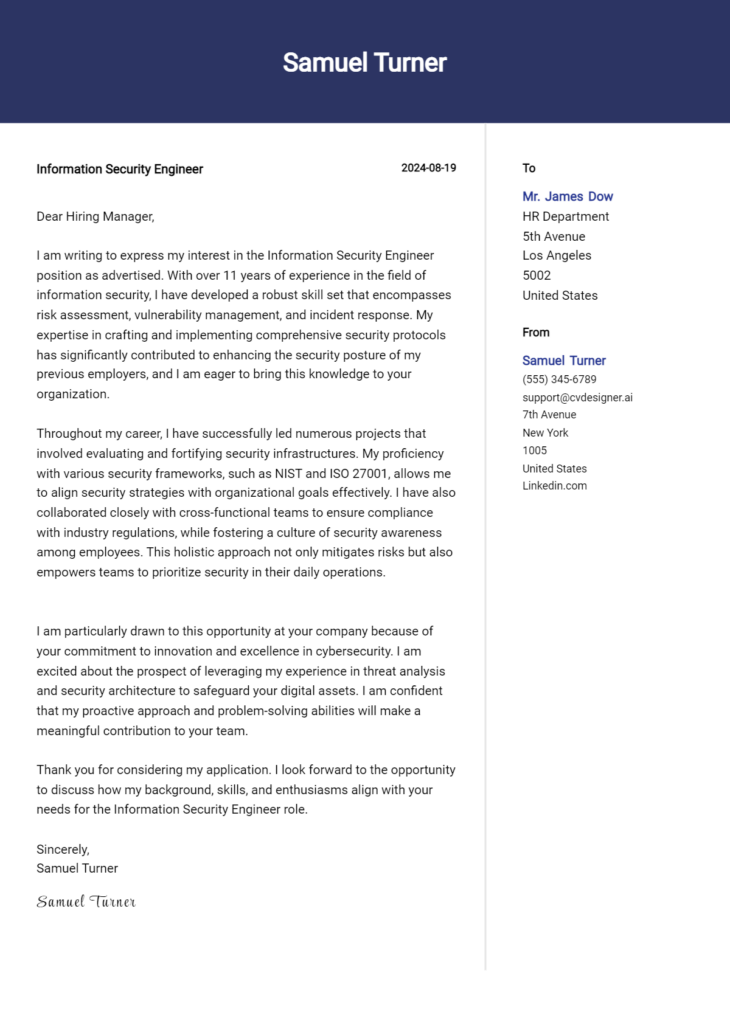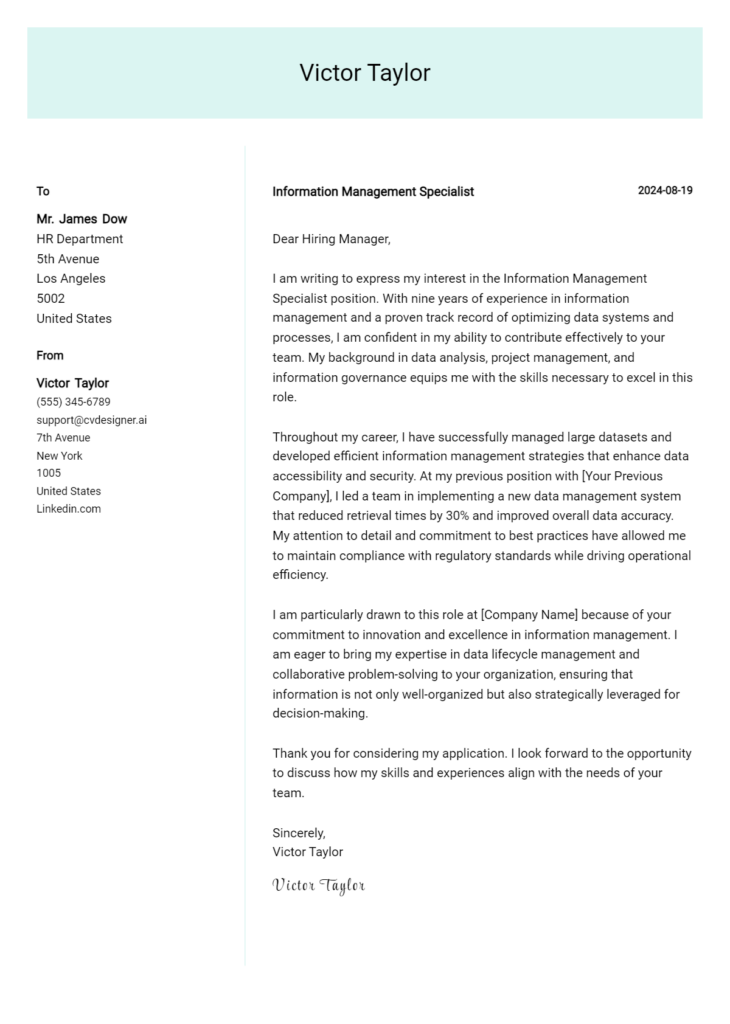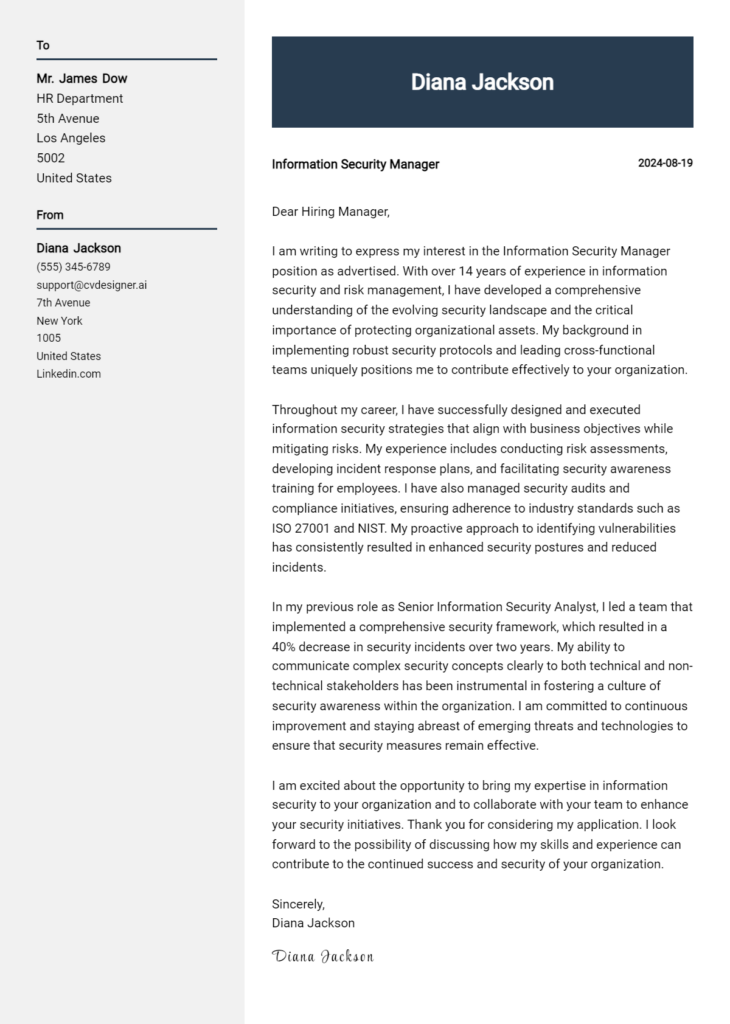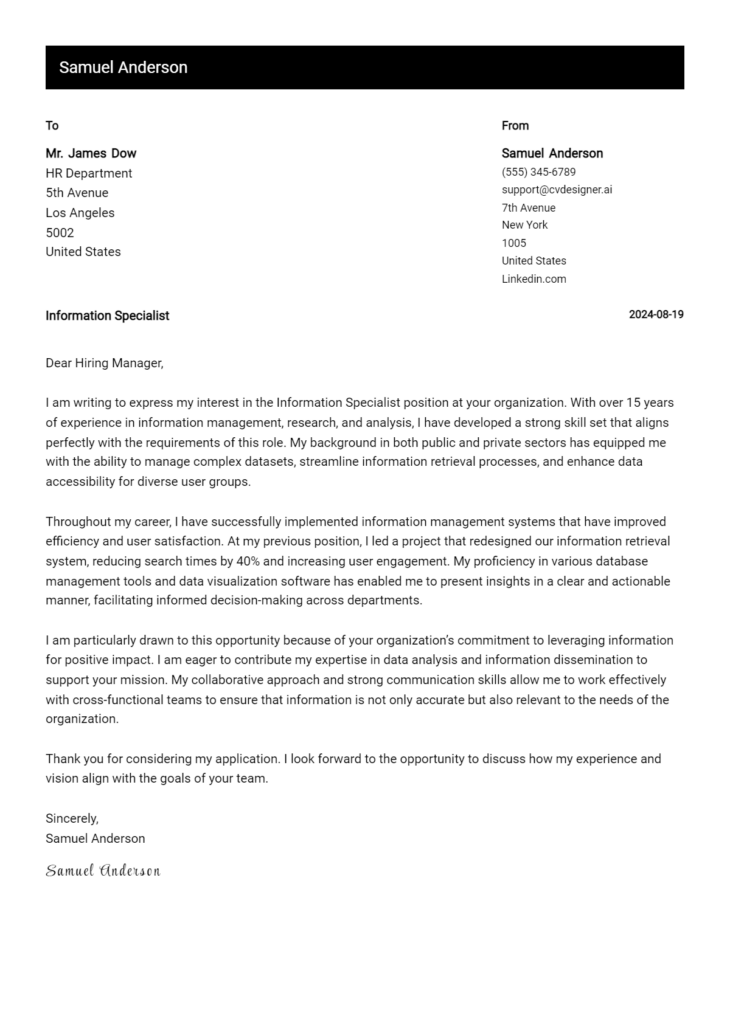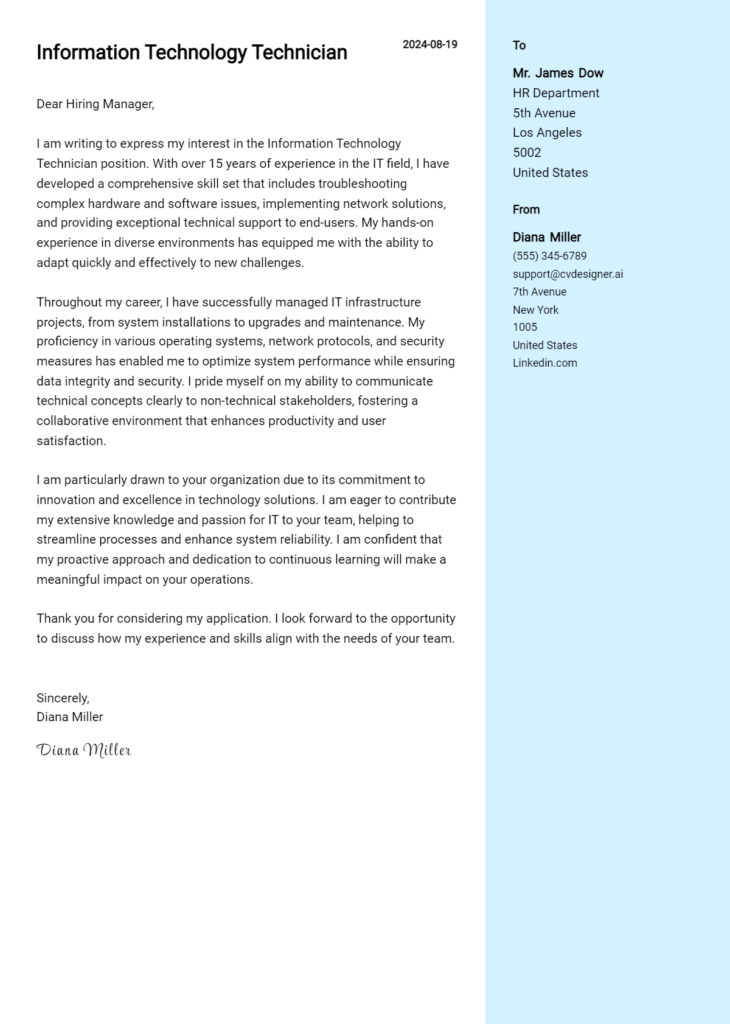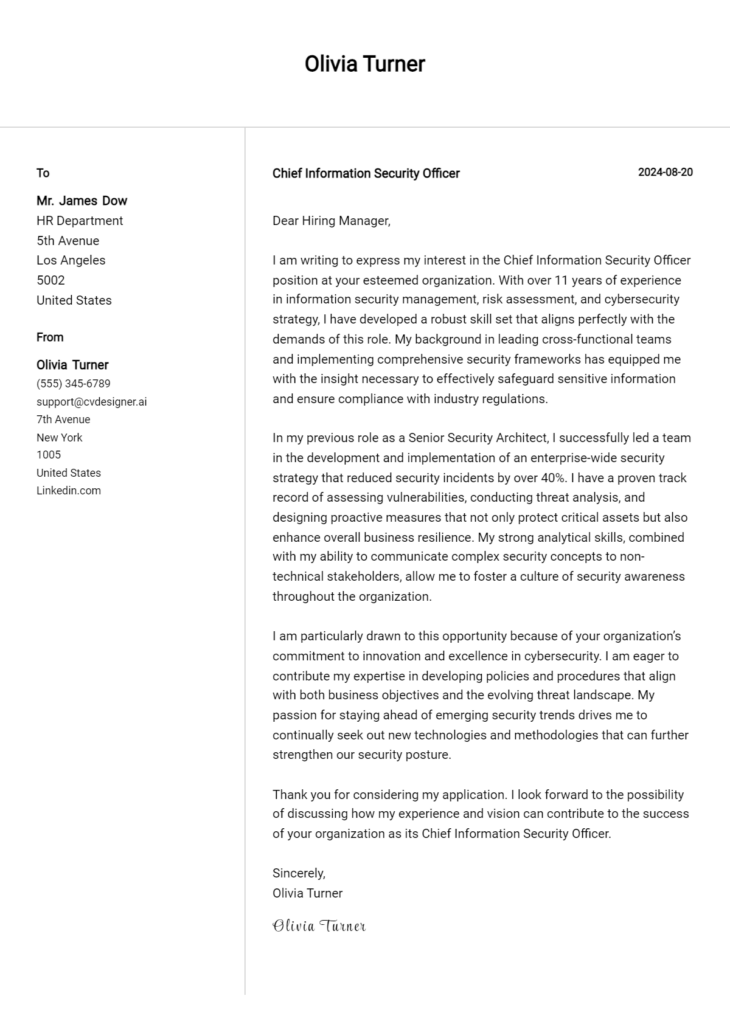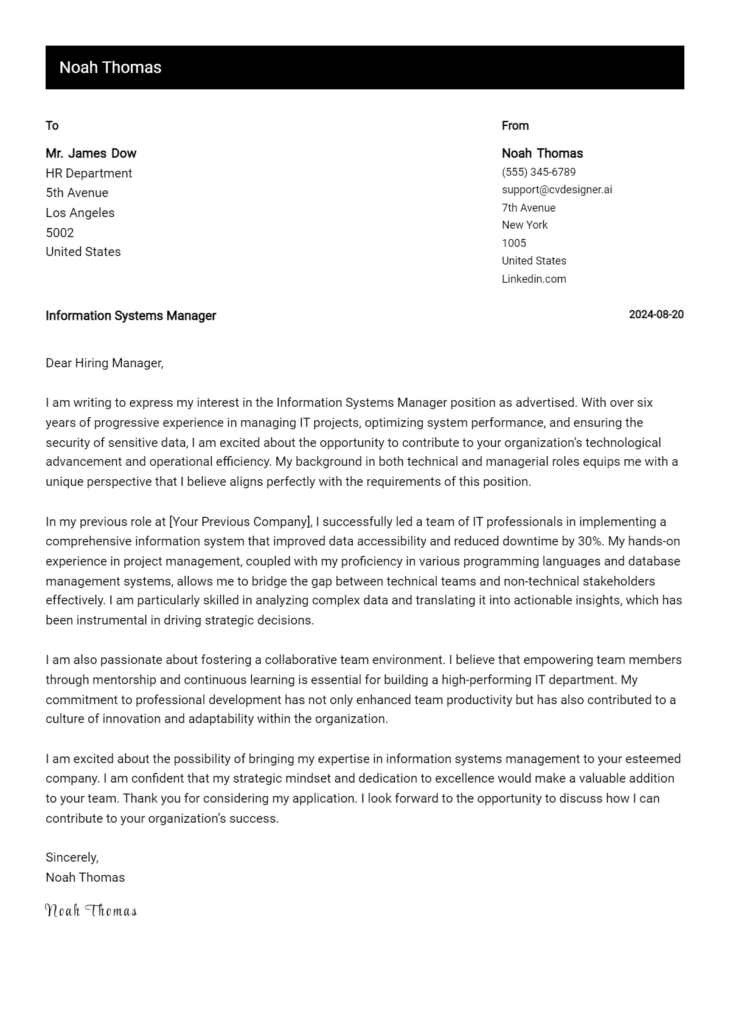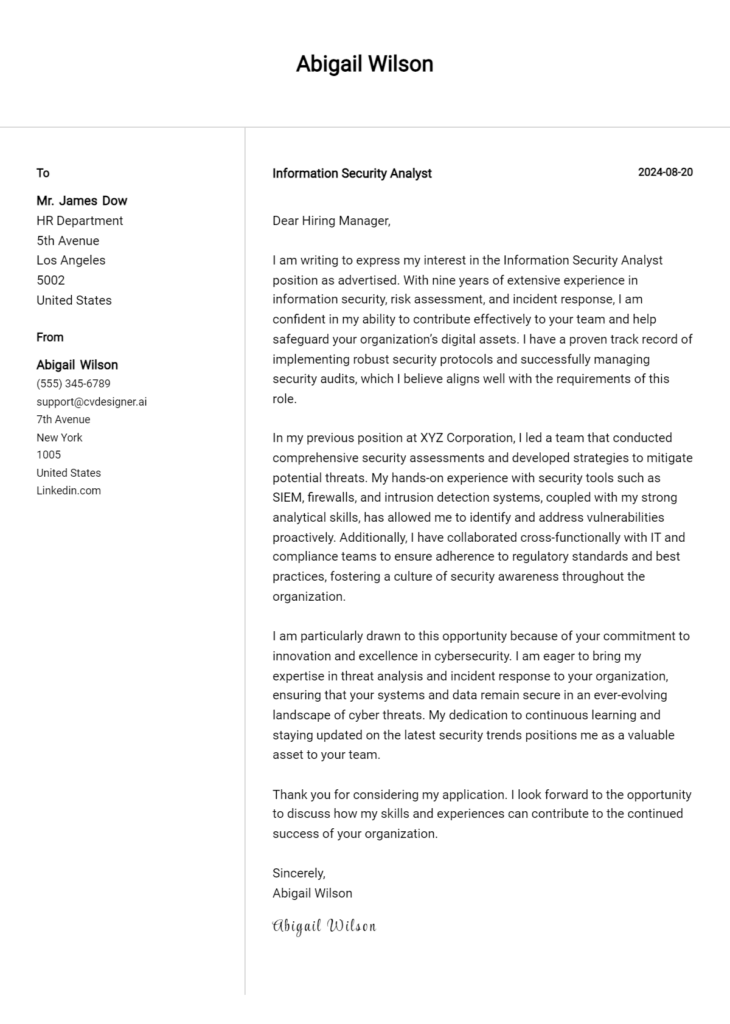Most Popular Information Analyst Cover Letter Examples
Explore additional Information Analyst cover letter samples and guides and see what works for your level of experience or role.
Crafting a compelling cover letter as an Information Analyst is essential for standing out in today’s competitive job market. This article will guide you through the nuances of writing an effective cover letter that not only captures your skills and experiences but also aligns them with the specific requirements of the role. Whether you are a seasoned professional or just starting your career, understanding the impact of a well-structured cover letter can significantly enhance your prospects. By the end of this guide, you will have a clear roadmap to create a powerful cover letter that resonates with hiring managers. Here’s what we’ll cover:
- What does an Information Analyst Cover Letter accomplish?
- Key Components of an Information Analyst Cover Letter
- Format of an Information Analyst Cover Letter
- Three different level cover letter examples
- Common Mistakes to Avoid in an Information Analyst Cover Letter
- Key Takeaways
Dive in to discover how you can effectively communicate your value and secure that coveted interview!
What does a Information Analyst Cover Letter accomplish?
A cover letter for an Information Analyst serves as a vital tool that not only introduces the candidate to potential employers but also highlights their relevant skills and experiences tailored to the specific position. It provides an opportunity to elaborate on key qualifications, such as data analysis proficiency and problem-solving abilities, that may not be fully captured in a resume. By showcasing a genuine interest in the role and the organization, a well-crafted cover letter can differentiate a candidate from others in a competitive job market. For those looking to refine their approach, utilizing a cover letter guide can offer valuable insights, while a cover letter builder can streamline the writing process, ensuring that all essential elements are included.
Key Components of a Information Analyst Cover Letter
- Introduction and Purpose: Start with a strong opening statement that clearly states the position you are applying for and expresses your enthusiasm for the role. Mention how you found the job listing and briefly highlight your relevant experience or qualifications.
- Relevant Skills and Experiences: Discuss specific skills and experiences that make you a suitable candidate for the Information Analyst position. Provide examples of how you have successfully utilized data analysis tools, methodologies, and technologies in previous roles. This section can be bolstered by reviewing cover letter examples to see how others have effectively communicated their skills.
- Understanding of the Company and Industry: Show that you have researched the company and understand its goals, values, and challenges. Explain how your background aligns with the company’s mission and how you can contribute to achieving its objectives as an Information Analyst.
- Closing Statement and Call to Action: End with a strong closing statement that reiterates your interest in the position and invites the hiring manager to contact you for an interview. Be sure to express your eagerness to discuss how your background, skills, and enthusiasms can benefit the organization. For additional guidance, consider reviewing the recommended cover letter format to ensure your letter is professionally structured.
How to Format a Information Analyst Cover Letter
When applying for a position as an Information Analyst, your cover letter should effectively convey your analytical skills, attention to detail, and ability to transform data into actionable insights. A well-structured cover letter can set you apart from other candidates and showcase your qualifications for the role.
- Begin with a strong opening that captures the hiring manager's attention, mentioning the specific position you are applying for and how you learned about the opportunity.
- Highlight your educational background, emphasizing any relevant degrees or certifications in data analysis, statistics, or information technology.
- Discuss your experience with data collection, management, and visualization tools, such as SQL, Excel, Tableau, or Power BI, and how they relate to the job requirements.
- Provide examples of past projects where you successfully analyzed complex datasets and provided insights that led to improved decision-making or operational efficiencies.
- Mention your proficiency in statistical analysis and methodologies, describing how you have applied these skills in real-world scenarios.
- Emphasize your ability to communicate technical information clearly to non-technical stakeholders, showcasing your interpersonal skills and teamwork experience.
- Illustrate your problem-solving abilities by detailing a specific challenge you faced in a previous role and the strategies you employed to overcome it.
- Discuss your familiarity with data governance and compliance standards, as well as your commitment to maintaining data integrity and security.
- Convey your enthusiasm for the company and the role, explaining why you believe you would be a great fit for their team and mission.
- Conclude with a strong closing statement expressing your eagerness to discuss your application further and your availability for an interview.
Information Analyst Entry-Level Cover Letter Example #1
I am writing to express my interest in the Information Analyst position at [Company Name], as advertised on [where you found the job posting]. With a strong educational background in data analysis and a passion for transforming data into actionable insights, I am excited about the opportunity to contribute to your team and support data-driven decision-making processes.
During my studies at [Your University], I gained a solid foundation in data analysis techniques and tools, including SQL, Python, and Tableau. My coursework included projects where I conducted thorough data analyses, interpreted complex datasets, and presented my findings to peers and faculty. For instance, in my capstone project, I analyzed customer behavior trends for a local retail store, which involved collecting and cleaning data, performing statistical analysis, and visualizing the results. This experience honed my analytical skills and strengthened my ability to communicate data insights effectively.
In addition to my academic experience, I completed an internship at [Previous Company/Organization], where I assisted in compiling and analyzing sales data to identify areas for improvement. Working closely with senior analysts, I learned how to create detailed reports and dashboards that informed strategic decisions. I also collaborated with team members to streamline data collection processes, which improved the efficiency of our reporting system. This hands-on experience allowed me to apply my analytical knowledge in a real-world setting and reinforced my commitment to pursuing a career in information analysis.
I am particularly drawn to the mission of [Company Name] and admire the innovative approaches you take in utilizing data to enhance operations. I am eager to bring my strong analytical abilities, attention to detail, and enthusiasm for data-driven insights to your team. I am confident that my skills align well with the requirements of the Information Analyst role and that I will quickly become a valuable asset to [Company Name].
Thank you for considering my application. I look forward to the opportunity to discuss how my background and passion for data analysis can contribute to the continued success of your organization.
Information Analyst Mid-Level Cover Letter Example #2
I am writing to express my interest in the Information Analyst position at [Company Name], as advertised on [Where You Found the Job Posting]. With over five years of experience in data analysis, information management, and strategic reporting, I am excited about the opportunity to contribute my skills to your esteemed organization.
In my previous role at [Previous Company Name], I successfully led a team in the development and implementation of a data analytics framework that improved data retrieval efficiency by 30%. By leveraging tools such as SQL, Python, and Tableau, I was able to transform complex data sets into actionable insights that directly informed executive decision-making. This experience honed my ability to analyze and interpret large volumes of data, ensuring that our strategies were data-driven and aligned with overall business objectives.
Moreover, I took the initiative to design a training program for junior analysts, focusing on best practices for data visualization and storytelling. This program not only enhanced the team's analytical capabilities but also fostered a collaborative environment where knowledge was shared openly. My commitment to continuous improvement and mentorship reflects my belief in the importance of cultivating talent within an organization.
In addition to my technical expertise, I have a strong track record of collaborating with cross-functional teams to support various business initiatives. For instance, I worked closely with the marketing department to analyze customer behavior data, which led to the successful launch of a targeted campaign that increased engagement by 25%. My ability to communicate complex findings in a clear and concise manner has been instrumental in bridging the gap between technical analysis and strategic business discussions.
I am particularly drawn to [Company Name] due to its commitment to innovation and data-driven decision-making. I am eager to bring my background in information analysis to your team and contribute to projects that drive meaningful outcomes. I am looking forward to the opportunity to discuss how my skills and experiences align with the goals of your organization. Thank you for considering my application.
Information Analyst Experienced Cover Letter Example #3
I am writing to express my interest in the Information Analyst position at [Company Name] as advertised. With over ten years of dedicated experience in data analysis, information management, and strategic reporting, I have honed my skills in transforming complex data into actionable insights that drive business decisions. My extensive background in various industries, including healthcare and finance, has equipped me with a robust analytical toolkit and a keen understanding of data-driven methodologies.
In my previous role at [Previous Company Name], I led a team of analysts in the development of a comprehensive reporting system that improved data accuracy and accessibility across the organization. By implementing advanced analytical techniques and utilizing tools such as SQL and Tableau, I was able to reduce reporting time by 40% while enhancing the clarity and relevance of the insights generated. This initiative not only streamlined our internal processes but also empowered stakeholders with timely information to make informed decisions.
Additionally, I have successfully collaborated with cross-functional teams to identify key performance indicators and create customized dashboards that align with strategic objectives. My ability to communicate complex data findings in a clear and concise manner has been instrumental in fostering collaboration between technical and non-technical teams. For example, during a critical project at [Another Previous Company Name], I facilitated workshops that bridged the gap between data science and operational teams, resulting in a 25% increase in project efficiency.
I am particularly drawn to the opportunity at [Company Name] because of your commitment to leveraging data for innovative solutions. I am eager to contribute my expertise in data analysis and visualization to support your mission and drive impactful results. I am confident that my analytical skills, combined with my proactive approach to problem-solving, will make me a valuable asset to your team.
Thank you for considering my application. I look forward to the opportunity to discuss how my experience and vision align with the goals of [Company Name]. I am excited about the possibility of contributing to your organization and am available at your earliest convenience for a conversation.
Cover Letter Tips for Information Analyst
When crafting a cover letter for an Information Analyst position, it's essential to tailor your message to highlight your analytical skills, technical expertise, and ability to derive actionable insights from data. Begin with a strong introduction that captures the hiring manager's attention, and clearly articulate your understanding of the role and the organization’s goals. Use specific examples to demonstrate your experience with data analysis tools, methodologies, and your problem-solving capabilities. Ensure your tone is professional yet enthusiastic, reflecting your genuine interest in the position and the value you bring to the team.
Cover Letter Tips for Information Analyst:
- Personalize Your Greeting: Whenever possible, address your cover letter to a specific person rather than using a generic salutation.
- Highlight Relevant Skills: Focus on the key skills mentioned in the job description, such as data visualization, statistical analysis, or experience with specific software like SQL, Python, or Tableau.
- Showcase Analytical Achievements: Provide concrete examples of projects or analyses you've completed that led to significant outcomes, such as improved processes or cost savings.
- Express Your Passion for Data: Convey your enthusiasm for data analysis and how it drives decision-making in organizations, emphasizing your commitment to continuous learning in this field.
- Demonstrate Problem-Solving Ability: Share instances where you've identified data-related challenges and implemented solutions that have made a positive impact.
- Keep It Concise: Aim for a clear and concise letter that is no longer than one page, ensuring every sentence adds value.
- Include Quantifiable Metrics: Whenever possible, use numbers to illustrate your accomplishments (e.g., “Increased reporting efficiency by 30% through the automation of data collection processes”).
- Proofread Thoroughly: Before sending your cover letter, review it multiple times to eliminate any typos or grammatical errors, as attention to detail is crucial for an Information Analyst.
How to Start a Information Analyst Cover Letter
As you embark on your journey to apply for the position of Information Analyst, your cover letter's introduction plays a crucial role in capturing the attention of hiring managers. A strong opening should convey your enthusiasm for the role while highlighting your relevant experience and skills. Here are several examples of effective cover letter introductions for an Information Analyst position:
I am excited to apply for the Information Analyst position at [Company Name], as advertised on [Job Board]. With a robust background in data analysis and a passion for transforming complex data sets into actionable insights, I am eager to contribute to your team and support data-driven decision-making.
As a detail-oriented professional with over five years of experience in data management and analysis, I was thrilled to discover the Information Analyst opening at [Company Name]. My expertise in utilizing advanced analytical tools to derive meaningful insights aligns perfectly with the needs of your organization.
With a strong foundation in statistics and data visualization, I am writing to express my interest in the Information Analyst role at [Company Name]. My background in interpreting data trends and providing strategic recommendations has equipped me with the skills necessary to excel in this position.
Having successfully managed multiple data analysis projects that resulted in significant process improvements, I am eager to apply for the Information Analyst position at [Company Name]. I believe my analytical mindset and commitment to data integrity will make me a valuable asset to your team.
I am writing to express my enthusiasm for the Information Analyst position at [Company Name], as I am drawn to your commitment to leveraging data to drive innovation. My extensive experience in data mining and reporting positions me well to contribute to your goal of enhancing operational efficiency and insights.
How to Close a Information Analyst Cover Letter
Closing your cover letter as an Information Analyst is crucial to leave a lasting impression. Here are some examples of effective closing content:
- I am excited about the possibility of contributing to your team and leveraging my analytical skills to drive data-driven decisions at [Company Name]. Thank you for considering my application; I look forward to the opportunity to discuss how I can add value to your organization.
- I appreciate your time and consideration of my application. I am eager to bring my expertise in data analysis to [Company Name] and help your team achieve its goals. I hope to discuss my application further in an interview.
- Thank you for reviewing my application. I am enthusiastic about the chance to apply my analytical skills and experience at [Company Name] and am looking forward to the possibility of discussing my fit for the role in more detail.
- I am grateful for the opportunity to apply for the Information Analyst position at [Company Name]. I believe my passion for data analysis and my dedication to uncovering insights can greatly benefit your team. I look forward to the possibility of discussing my application with you.
- Thank you for considering my application for the Information Analyst role. I am excited about the prospect of working with [Company Name] and contributing to innovative data solutions. I hope to speak with you soon to explore how I can support your team's objectives.
Common Mistakes to Avoid in a Information Analyst Cover Letter
When crafting a cover letter for an Information Analyst position, it’s essential to make a strong impression that showcases your analytical skills, attention to detail, and understanding of data-driven decision-making. However, many candidates make common mistakes that can undermine their efforts to stand out in a competitive job market. To help you avoid these pitfalls, here are several errors to watch out for when writing your cover letter:
- Using a Generic Template: Failing to personalize your cover letter can make it seem insincere and unengaged. Always tailor your content to the specific role and company.
- Focusing on Responsibilities Instead of Achievements: Rather than merely listing previous job duties, highlight your accomplishments and how they relate to the job you’re applying for.
- Neglecting to Research the Company: Not demonstrating knowledge about the company’s mission, values, and projects can make your application seem superficial.
- Excessive Length: A cover letter should be concise; avoid lengthy paragraphs and stick to one page to keep the reader’s attention.
- Inadequate Proofreading: Spelling and grammatical errors can convey a lack of professionalism and attention to detail, which are crucial in an analytical role.
- Lack of Specific Examples: Failing to provide concrete examples of your analytical skills and experiences can weaken your case for being suitable for the role.
- Overly Technical Language: While it's important to showcase your expertise, using jargon that may not be understood by all readers can alienate hiring managers.
- Ignoring the Job Description: Not addressing specific qualifications or requirements mentioned in the job posting can signal that you haven’t fully engaged with the application process.
- Missing a Strong Closing Statement: A weak conclusion can leave a lasting negative impression. Ensure you end with a compelling statement that reinforces your interest in the role and encourages further communication.
Key Takeaways for a Information Analyst Cover Letter
In conclusion, a well-crafted cover letter for an Information Analyst position should effectively showcase your analytical skills, attention to detail, and ability to translate complex data into actionable insights. By tailoring your cover letter to highlight relevant experiences and aligning them with the specific requirements of the job, you can make a compelling case for your candidacy. Utilizing resources such as cover letter templates can provide a solid foundation for your writing, ensuring that you maintain a professional tone and structure throughout.
Additionally, leveraging a cover letter builder can streamline the process, allowing you to focus on emphasizing your unique qualifications and achievements. By taking the time to personalize your cover letter and demonstrate your enthusiasm for the role, you'll enhance your chances of making a strong impression on potential employers and securing an interview.
